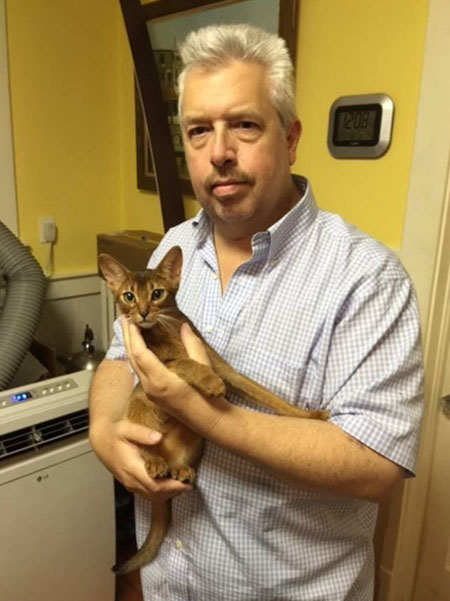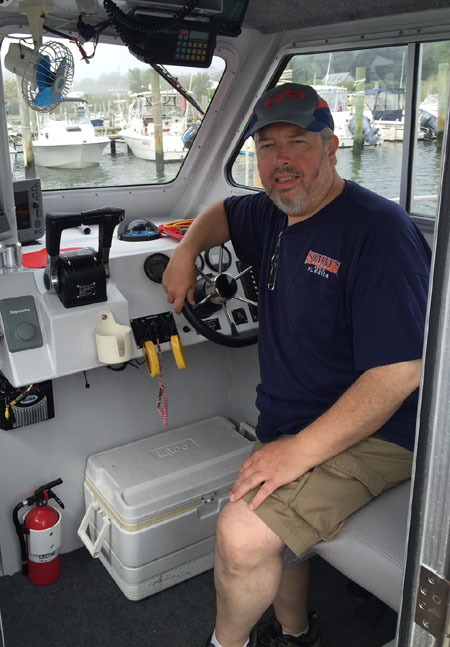
Mike and his cat, Khalissie

On board his high school friend's boat, Groton
| MIKE WALLACE -URGENT NEED- KIDNEY TRANSPLANT |
| COMMON QUESTIONS AND ANSWERS ABOUT THE DONATION PROCESS |
| Mike's blood type is A+ or universal type "O". You can save Mike's life by donating just one kidney, but you likely have some questions and concerns. I have attempted to answer some of those below. Yale-New Haven Hospital has ALL the answers ! |
 Mike and his cat, Khalissie |
 On board his high school friend's boat, Groton |
| View a video about kidney donation by Mike's potential Transplant Surgeon, via this link: http://www.ynhh.org/transplantation-center/become-an-organ-donor.aspx Click on the video to see and hear Dr. Mulligan's story. |
| ABOUT THE QUESTIONS AND ANSWERS,SHOWN BELOW: This information comes from nearly 9 hours that Jean and I spent at Yale New Haven Hospital, going through every step of the donor-recipient program. Here's an overview of our day: |
| Our oldest son Michael has been on dialysis for well over two years, with his program starting at Hartford Hospital then transferring to Yale. Jean and I, accompanying Michael, spent over eight hours with what was an overwhelming experience at Yale. The program started in a conference room, with about nine people who were all going through the same process that day. It started with a presentation, by one of the doctors who perform the transplant surgery. Later, we also met with him one on one. What an extremely impressive and nice individual ! We also met with the Chief of Staff for that group, also equally impressive. That was followed by presentations from the financial director, resident pharmacist, a nutritionist, and Michael's patient advocate. Interesting to note that medical coverage for the donor is covered by the hospital initially and completely, so they essentially have no out-of-pocket costs. Money lost due to their unemployment may also be covered by a separate fund. They are in the hospital for only 2 to 3 days, and usually back to work in 2 to 3 weeks, depending on the nature of their work. The rest of the day was spent with one-on-one meetings with each of these people, and then Michael had to go through some medical testing including two rounds of blood tests, EKG, chest x-rays and a myriad of medical history questions. Bear in mind that all this is ultimately to determine if Michael was a qualified candidate for a transplant in eyes of the Yale-New Haven team. That determination was made following their review of all the data gathered and in his previous medical records. I provide this information to you so that if you have friends or family who are in a similar situation you will have a feel for what is involved. As far as candidates for donors are concerned, there are many parameters , considered including probability curves and even data algorithms that come into play. Ideally, a live donor is best, but it does not necessarily have to be a family member. PS: Michael was selected as an excellent candidate within one week of these meetings ! |
| COMMON QUESTIONS AND ANSWERS |
| Q: How is Mike doing today ? A: Mike had several setbacks over the last year. They involved surgey, including gall bladder removal and Pancreatitus treatment in August. Mike was very ill during that time, but now has recovered nicely. In fact, if you were to see him today, he looks very good, which is why it's so important to find a donor now, while he is still healthy enough to qualify for the transplant. Note that he is on dialysis 9 hours and 50 minutes each and every day.With a new kidney, he can resume a normal life, and a normal life expectancy, which is what we want for Mike ! |
| Q: Do I have to be a perfect match ? A: Not necessarily. Through a program call "Donor Exchange", it is possible to get Mike a kidney and save his life ! |
| Q: What is involved in the donor testing process ? A: The prospective donor simply calls Yale-New Haven Hospital's Donor Hot Line, 866..925..3897, and they take it from there. It starts with a questionnaire which you complete by phone or email. If you pass that, then you take a simple blood test. |
| Q: Do I need to drive to New Haven to take the blood test ? A: Absolutely not. The test can be given locally, then the results are sent to YNH. |
| Q: What happens if I pass those first two tests ? A: YNH will then set up a meeting with you .They will explain fully what is involved. You'll be pleasantly surprised that it's easier than you think. |
| Q: What about costs ? A: YNH covers all the costs of the testing, the surgery, hospital stay and medications. They can be more specific and answer all your cost related questions. |
| Q: Is all the information I provide confidential ? A: Absolutely ! No one but you and YNH will have your information, unless you choose to discuss your desire to be a donor with Mike. |
| Q: What organs can come from living donors? A: The organ most commonly given by a living donor is the kidney. People usually have two kidneys, and one is all that is needed to live a normal life. Parts of other organs including the lung, liver and pancreas are now being transplanted from living donors. |
| Q: How long will I be in the hospital following surgery ? A: Typically 2-3 days ! Not weeks or months. Again, everyone is different and YNH should be your source for this information. |
Q: Will there be a big
scar ? A: The surgery is typically done using a laparoscope. (Minimally
Invasive) Small incisions = faster recovery ! Maybe 3-4 small
incisions.Obviously, everyone is different, but YNH has some great success
stories and all the facts about the surgery..
|
| Living VS Deceased Donor :For people in kidney failure, a kidney transplant can extend and improve their lives. Both transplants from living and deceased donors extend lives but living donations have some additional benefits: Living donor kidneys last longer ! Per the doctors at YNH, the kidney from a living donor may function better and sooner; kidneys from a deceased donor can take a while to start working The surgery can be scheduled at a convenient time for both the donor and the recipient. Yes, it is a big decision to donate a kidney, but please know that living donors save lives ! A living donor candidate is a person who is healthy, well-informed and makes a voluntary decision to donate one of their kidneys. Please make that life-saving decision. Get tested, get approved, and PLEASE save Mike's life. |
| Back to the Home page |